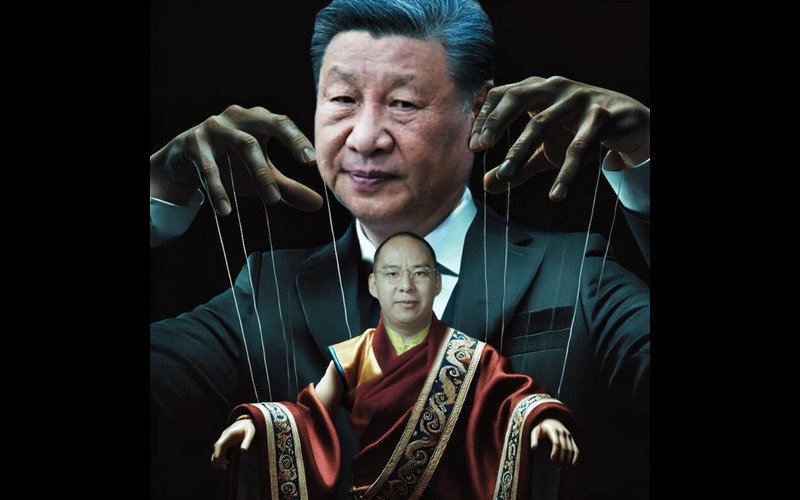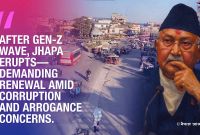Caught in Controversy: Global Hesitation Over China's Panchen Lama

China has been actively working to enhance the international profile of its chosen 11th Panchen Lama, Gyaltsen Norbu. Also known as Gyaincain Norbu or Chökyi Gyalpo, Gyaltsen Norbu was born on February 13, 1990, in Lhari County, Tibet Autonomous Region (TAR). He is considered the 11th Panchen Lama by the Chinese government, although this recognition is disputed by the Tibetan government-in-exile, which recognizes Gedhun Choekyi Nyima, the boy recognized by the 14th Dalai Lama, as the rightful Panchen Lama.
China has organized international visits for Gyaltsen Norbu, including trips to Thailand and Nepal. These visits aim to increase his visibility and acceptance among the global Buddhist community. China hopes that by enhancing Gyaltsen Norbu's profile, he will be able to influence the succession process of the 14th Dalai Lama and endorse China's chosen candidate for the 15th Dalai Lama.
Gyaltsen Norbu holds significant positions within the Buddhist Association of China (BAC), which helps in promoting his influence. He spent his early childhood in Beijing, where he was educated in a Chinese manner. He later moved to Tashilhunpo Monastery in Shigatse for his enthronement in 1995. Besides holding significant positions within the BAC, he is also a member of the National Committee of the Chinese People's Political Consultative Conference.
His appointment as the Panchen Lama is controversial, with the Chinese government selecting him through the drawing of a Golden Urn, a method rejected by the Tibetan government-in-exile. Gedhun Choekyi Nyima, chosen by the 14th Dalai Lama, has been detained by the Chinese government since 1995 and has not been seen since.
Despite China's efforts to promote him, Gyaltsen Norbu has not gained widespread acceptance among Tibetan communities, who regard him as a government-appointed figure lacking religious legitimacy. Gyaltsen Norbu has made several public appearances, including delivering speeches at international Buddhist conferences. However, his role is often seen as a political tool to undermine the Dalai Lama's authority and legitimize Beijing's control over Tibetan Buddhism.
In order to strengthen his claim, China was organizing two international visits for Gyaltsen Norbu to enhance his profile and legitimacy. The first visit was planned for Thailand from December 5-6, 2024 where he was supposed to be part of a delegation carrying Buddha relics for an exposition. The second visit was planned to Nepal from December 15-16, where he was scheduled to attend the 9th South China Sea Buddhism Roundtable Conference in Lumbini, the birthplace of Lord Buddha. Until now, Gyaltsen Norbu's international exposure has been limited to his participation in Vesak-related events in Bangkok in May 2019 as part of the Buddhist Association of China delegation. The visits to Thailand and Nepal were part of China's efforts to enhance his profile and legitimacy on the global stage.
The Chinese delegation accompanying Gyaltsen Norbu on these international visits includes officials from the Chinese State Administration of Religious Affairs (SARA). These officials are responsible for overseeing religious affairs in China and ensuring that the government's policies on religion are implemented. As the central organization for Buddhism in China, the Representatives from the Buddhist Association of China (BAC) play a crucial role in managing and promoting Buddhism both domestically and internationally. Abbots from various Chinese monasteries represent different monasteries across China and contribute to the religious and cultural exchange during these visits. Artists in the delegation highlight the cultural aspect of these visits and promote Chinese art and heritage on the international stage. This combination of religious, administrative, and cultural representatives aims to present a well-rounded and cohesive image of Chinese Buddhism and its practices.
International Perception of Gyaltsen Norbu:
These elaborate visits are part of China's broader strategy to position Gyaltsen Norbu as a credible Buddhist leader and influence the succession process of the Dalai Lama. However, there have been some challenges, such as reluctance from the Thai government to Norbu’s participation. Despite China's aggressive pursuit of the issue through its embassy in Bangkok, the Thai government was hesitant. As a pressure tactic, China has demanded 40 million Thai Baht (approximately US$ 1.15 million) from the Thai government for the exposition.
The Thai government is cautious about the political implications of accepting Gyaltsen Norbu. His presence could be seen as endorsing China's control over Tibetan Buddhism, which might not align with Thailand's diplomatic stance. The Thai government was deeply concerned about the reaction of the Buddhist community in Thailand to Gyaltsen Norbu's visit, with the possibility of public backlash or protests. China's demand for 40 million Thai Baht (approximately US$ 1.15 million) for the exposition added a financial dimension to Thailand’s reluctance, in addition to being an undue pressure tactic by Beijing.
The approval for Gyaltsen Norbu's visit to Nepal was given by Nepalese Prime Minister K.P. Oli after the intervention of Chen Song, the Chinese Ambassador to Nepal. The visit was scheduled to coincide with the 9th South China Sea Buddhism Roundtable Conference in Lumbini, which is expected to draw participation from government officials and monks from around 20 countries. So, Nepal's acceptance of Gyaltsen Norbu's visit was complicated, sparking controversy and criticism from various quarters, including Tibetan communities and international human rights groups and of course raising questions about Nepal's geopolitical positioning and its role in Beijing's broader regional strategies.
Ultimately, Gyaltsen Norbu's visit to Thailand from December 5-6 and to Nepal from December 12-15, did not take place as planned. Despite China's efforts and the delegation carrying Buddha relics for the exposition, the Thai government's reluctance and the associated financial demands seem to have hindered the visit. Following diplomatic concerns and the sensitivity of the visit, the Nepalese government also decided to halt the visit. This decision was influenced by reports highlighting the geopolitical risks of hosting Gyaltsen Norbu.
Many Buddhists around the world simply do not accept Gyaltsen Norbu, widely seen as a political tool used by China, as the legitimate Panchen Lama. Gyaltsen Norbu was appointed by the Chinese government through a process that is not recognized by the Tibetan community. The traditional method involves the Dalai Lama identifying the reincarnation, and the Tibetan government-in-exile recognizes Gedhun Choekyi Nyima as the rightful Panchen Lama. The disappearance of Gedhun Choekyi Nyima, has raised significant human rights concerns. Many Buddhists and human rights groups view Gyaltsen Norbu's appointment as part of China's efforts to suppress Tibetan religious and cultural identity. Various international organizations and human rights groups have criticized China's interference in Tibetan Buddhism and called for the release of Gedhun Choekyi Nyima.




![From Kathmandu to the World: How Excel Students Are Winning Big [Admission Open]](https://nepalaaja.com/img/70194/medium/excel-college-info-eng-nep-2342.jpg)
